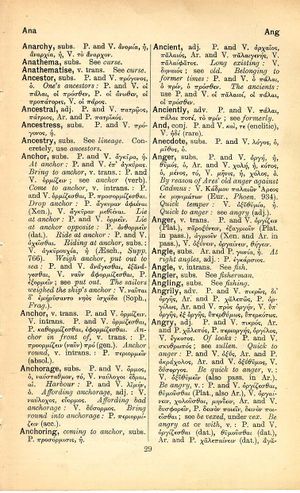angry
Λύπη παροῦσα πάντοτ' ἐστὶν ἡ γυνή → Mulier perenne pignus aegrimoniae est → Ein gegenwärtig Leid ist stets das Eheweib
English > Greek (Woodhouse)
adj.
P. and V. πικρός, Ar. and P. χαλεπός, P. περιοργής, ὀργίλος, V. ἔγκοτος.
Of looks: P. and V. σκυθρωπός; see sullen.
Quick to anger: P. and V. ὀξύς, Ar. and P. ἀκράχολος, Ar. and V. ὀξύθυμος, V. δύσοργος.
Be quick to anger, v.: V. ὀξυθυμεῖν (also pass. in Ar.).
Be angry, v.: P. and V. ὀργίζεσθαι, θυμοῦσθαι (Plat., also Ar.), V. ὀργαίνειν, χολοῦσθαι, μηνίειν, Ar. and V. δυσφορεῖν, P. δεινὸν ποιεῖν, δεινὸν ποιεῖσθαι; see be vexed, under vex.
Be angry at or with, v.: P. and V. ὀργίζεσθαι (dat.), θυμοῦσθαι (dat.), Ar. and P. χαλεπαίνειν (dat.), ἀγανακτεῖν (dat.), V. δυσμεναίνειν (dat.), ὀργαίνειν (dat.), χολοῦσθαι (dat.); see be vexed at, under vex.
Be angry at: also P. δυσχεραίνειν (acc., dat. or ἐπί, dat.), χαλεπῶς φέρειν (acc. or dat.), V. δυσφορεῖν (dat.), πικρῶς φέρειν (acc.).
Angry with his father for the deed of blood: V. πατρὶ μηνίσας φόνου (Soph., El. 1177).
Join in being angry, v.: P. συνοργίζεσθαι (dat.).

